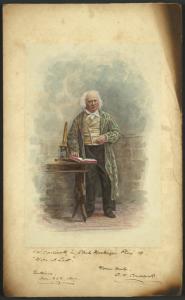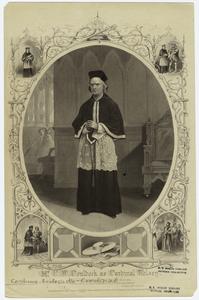As we arrange them the other day I decided to do a bit of research into the names and places mentioned on these sightly tattered and fragile old handbills that would be distributed in the streets, taverns and shops to highlight the theatrical delights that awaited audience in Liverpool, London and Toronto. Toronto?
Yes Toronto. The most recent of them is a playbill from the Royal Lyceum Theatre in Toronto dated June 6th 1854. The Royal Lyceum was the first purpose built theatre in the city. Opened in December of 1848, according to reports it was a noble edifice in the style of the times (I've been unable to find a photo or drawing). Built by wealthy landowner John Ritchey it seated 750 people and was complete with orchestra pit, balcony, dressing rooms and gaslight. For the next 26 years it as to be the temporary theatrical home of all the great performers as they passed through Toronto on their North American tours: Sir Henry Irving, Ellen Terry, Lily Langtry and the divine Sarah Bernhardt were amongst the famous names that delight Toronto audience at the Royal Lyceum. And on July 8th, 1853 Luigi Arditi's opera company presented the first full length opera to be seen in the city: Bellini's Norma with the Dutch soprano Rosa Devries singing the title role. The playbill assures the spectator that it will be performed "With appropriate scenery, Dresses, Full Choruses Male and Female and a Magnificent Orchestra".
From 1851 until it was destroyed by fire in 1874 the Royal Lyceum was leased by the Nickinson Theatre Company - led first by John Nickinson then his daughter Charlotte (Nickinson) Morrison. Until 1858 when she retired from the stage to marry the Toronto newspaper editor and critic Daniel Morrison, Charlotte was the leading lady of her father's company. After her husband's death in 1871 she took over the Royal Lyceum and went on to manage the Grand Opera House during its first seasons. Other members of Nickinson's company included his daughters Virginia and Eliza and his second wife Elizabeth .J. Phillips, who he met while lessee of the Metropolitan Theatre in Hamilton. After John Nickinson's death in 1864 Miss Phillips continue her appearances on stage in a 45 year career first as an ingenue and then as a leading character actress. The Nickinson Company toured throughout the continent but used Toronto and the Royal Lyceum as their home base, often being joined by a "guest star" to give a bit of added lustre to the season.
As I mentioned the playbill I found in a shop in London, of all places, is for a performance by the Nickinson Company on June 6th, 1854. For that week the British-born American actor C. W. Couldock was appearing with the Company as the title character in Richelieu, a historical drama of the type so dear to theatre goers of the time. At the start of his career Couldock was known for his Shakespearean roles and became one of the most beloved character actors of his time. His last appearance was on November 21, 1896 in Kansas City; for 59 of his 82 years he had been on stage, first in England and then America. He died two years later at his home in New York City still much loved and respected amongst the members of his profession and theatre goers.
 |
| In this portrait from the New York City Library Theatre collection, drawn in 1897, artist C. A. Muller shows Couldock in the popular play Won At Last. |
In 1837, a year after my grandmother's death, I got a letter from the late William Oxberry, the comedian, to an actor named Burton, who played second old man at Sadler's Wells Theatre, who was about to have what was called a 'ticket night' – that is he was to receive half the proceeds of the tickets he sold. I had studied the Shakespearean drama pretty thoroughly and I wanted to play Othello. This I told Burton and I offered to take £10 worth of tickets if he would allow me to make my début at his benefit. He heard me recite the part, and obtained permission from his manager, Nelson Lee, to give me the opportunity to act it. I distributed my tickets among my friends, mostly clerks in wholesale houses and I was thus assured of the presense of a large favourable element in the audience.
Well, the night came, and I played the part. I had a very good actor to assist me as Iago in the person of M. T. Hicks, then quite prominent on the London stage. My friends encouraged me by lavish applause, and the audience as a whole, was disposed to be friendly. ..... I got through the performance quite well up to the last act, when, as I was about to stab Desdemona I found I had no dagger. I was embarrassed, of course, but an amateur will often get out of a difficulty better than an old stager, and so I imagined the blade and struck her with my fist.
The next day my friends, the clerks, subscribe £50 to aid me in continuing on the stage, and thus encouraged I resigned my situation and got an engagement playing 'utility' with a small travelling company......New York Times - November 29, 1898.
 |
| Again from the NYC Library Theatre collection this print by Frederick Chapman shows Couldock in one of his later Shakespearean roles: Cardinal Wolsey in Henry VIII. |
True, This! —Bulwer-Lytton is also know for penning that immortal phrase: It was a dark and stormy night; ..... as the opening of his novel Paul Clifford.
Beneath the rule of men entirely great,
The pen is mightier than the sword. Behold
The arch-enchanters wand! — itself a nothing! —
But taking sorcery from the master-hand
To paralyse the Cæsars, and to strike
The loud earth breathless! — Take away the sword —
States can be saved without it!
The after-piece was also a popular farce of the time. Boots at the Swan was written in 1837 by Charles Selby, one of the prolific playwright-actors of the time. The part of Jacob was the calling card of Charles Peters, who became Eliza's husband the year he played the title character at the Royal Lyceum along with other members of the Nickinson clan. I notice that Charlotte and John are the only members of the family who did not seem to "do" farce.
One of the things that caught my eye on the poster was the bilingual tag at the bottom - well over a hundred years before official bilingualism in Canada. Laurent suggests that it may have been there because at the time France was a close ally of England in the conflict in the Crimea. Rather amusing in their eagerness to honour Napoleon III they manage to change his gender. Perhaps even then there was a Commissioner of Official Language as it was corrected on future playbills.
7 settembre/September - Santa Regina




1 comment:
Was it a mistake? Perhaps there was more to Napoleon III than met the eye.
Post a Comment